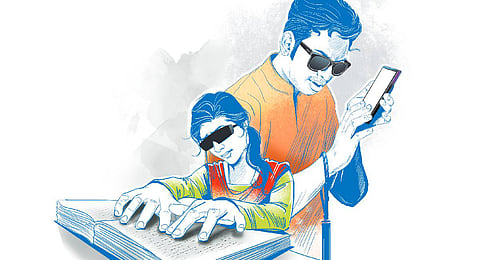

In a heartening development that could encourage the job market to be more inclusive — with regards to the visually-challenged, in this case — the Karnataka High Court has emphasised that preference should be given to those with “absolute blindness” over those with “low vision” in employment opportunities, albeit taking into consideration that it does not affect their ability to perform duties. This does not however mean that those with “low vision” are left out, instead it lays out a level playing field for those with disabilities — partial or total.
The case pertains to a visually-challenged woman candidate from the Scheduled Caste community in Periyapatna taluk of Mysuru district, who suffers from complete loss of sight. On March 8, 2023, her name was on the list of selected candidates for the post of Kannada and Social Studies teacher at a government primary school, for which she had applied the previous year. Despite her selection, her application was rejected on July 4, 2023. She challenged the rejection of her application before the Karnataka State Administrative Tribunal (KSAT), which, while ruling in her favour, directed the Department of School Education (DSE) to award her Rs 10,000 in costs, and set a deadline of three months to consider her application.
When the case came before the High Court, the DSE argued insisting that reservation for “low vision” and “absolute blindness” should be different categories, and that the KSAT had overlooked that difference. The High Court, while disagreeing with the DSE’s stance, noted that the candidate met the requirements for the role as a teacher for the said subjects, despite concerns about whether or not the “completely blind” candidate would be able to handle the responsibilities.
The heartening part is that the High Court stressed on the positive attributes of a person with complete blindness — resilience, adaptability, heightened nature of senses other than sight, strong memory and coping skills — and cited real-life success stories of people with “complete blindness”, like Helen Keller, John Milton, Louis Braille, Homer, and Srikanth Bolla. The last is an Indian industrialist and founder-chairman of Bollant Industries, who was the first visually-impaired student in Management Science at the Sloan School of Management of Massachusetts Institute of Technology, in Cambridge, Massachusetts, USA. Based on his story, the biopic Srikanth was released earlier this year with actor Rajkummar Rao playing the title role.
The High Court dismissed DSE’s appeal against the earlier KSAT order. Beyond the court order, this should be a lesson for the state government, civic agencies and the public in general, who need to open their eyes and mind to being inclusive in every possible domain of life. We need to perceive and understand “inclusivity” in broader terms than what we easily assume it to be — it should not be restricted to parities on just communal, caste or linguistic lines to which words like “majority” and “minority” are readily linked. We need to understand “inclusivity” for what it is — provision of equal access to opportunities and resources for those who might otherwise remain excluded or marginalised, and these must include the physically and mentally challenged.
A look at our public spaces should be enough to make it clear whether we do, or do not, practise inclusivity in its truest sense. It will also tell us how narrowly we practise inclusivity in our life and living, leaving our visually and physically challenged out of its ambit. While the High Court’s order was linked to a specific case, pertaining to a job opportunity, it needs to be applied to a larger domain of life itself. Failing which, we need to remember Helen Keller’s statement: “The only thing worse than being blind is having sight, but no vision.”
Nirad Mudur
Deputy Resident Editor, Karnataka
niradgmudur@newindianexpress.com